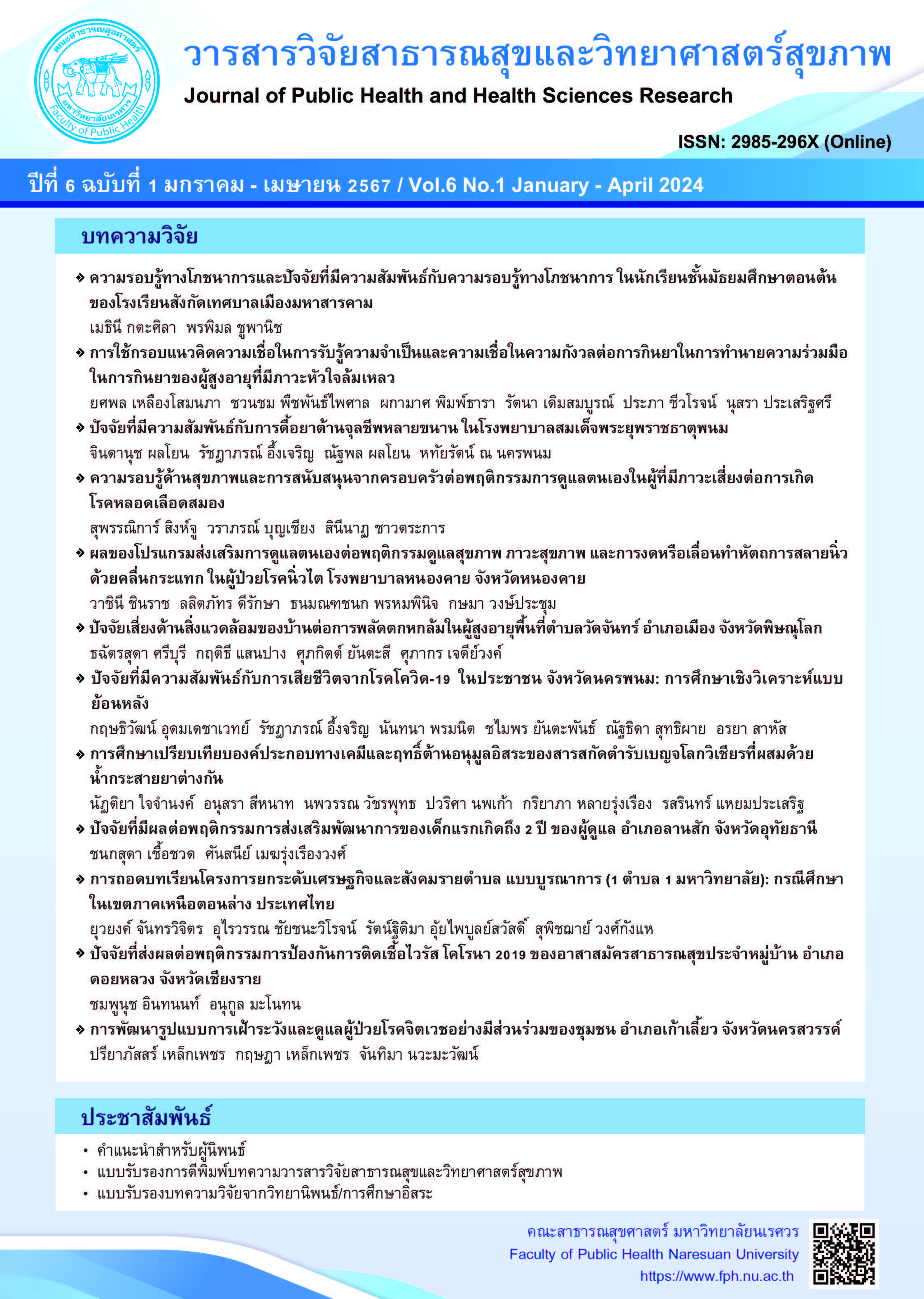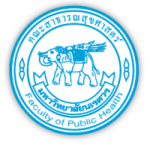The effect of self-care promotion program on health care behaviors, health status, and cancellation or postponement of the extracorporeal shock waves lithotripsy procedure in patients with renal calculi in Nongkhai Hospital, Nong Khai Province
Keywords:
Self-care promotion program, Health care behaviors, Health status, Extracorporeal shock waves lithotripsy procedureAbstract
This study aimed to evaluate the effect of self-care promotion program on health care behaviors, health status, and cancellation or postponement of the extracorporeal shock waves lithotripsy procedure in patients with renal calculi, Nongkhai Hospital, NongKhai Province. A sample of 60 cases was divided into an experimental group of 30 cases and a comparison group of 30 cases. General data, health care behaviors, health status, and cancellation/postponement of procedure were collected by interview form and record form. The experimental group received a self-care promotion program. The comparison group received a standard of care. General data was analyzed using descriptive statistics. Paired t-test and independent t-test were performed to compare the mean of health care behaviors and health status scores within the group and between groups. A Z-test was performed to compare the proportion of health status and cancellation/postponement of procedure between groups. A p-value less than 0.05 was considered to represent statistical significance.
The results found that after implementing the program, the mean scores of knowledge behavior and behavior of promoting stone expulsion of the experimental group were higher than before implementing the program and higher than the comparison group statistically significant. When comparing the mean scores of health status, after implementing the program, the experimental group had a significantly lower mean score of pain than the comparison group. The results of this study show that the self-care promotion program provides patients with an understanding of renal calculi and allows patients to have better behavior in promoting stone expulsion, also relieving pain patients after the procedure, which is another approach for public health personnel to apply the key point of the program by integrating with the normal standard of care for an initial health care and health promotion in patients undergoing the extracorporeal shock waves lithotripsy procedure.
References
Abdelmowla, R. A., Shahat, A. A., Abdelmowla, H. A., Hussein, A. H., Gamal, R. M., Mohammad, Z.A. et al. (2018). Health education protocol for patients undergoing shock wave lithotripsy for urolithiasis. IOSR Journal of Nursing and Health Science, 7(1), 11-16.
Abdelwahab, D., Alaa El-deen, S., Rezian, A., & Elhkouly, A. (2021). Effect of implementing evidence-based guidelines on lifestyle modification for adult patients with renal stone undergoing ESWL procedure. Egyptian Journal of Nursing and Health Sciences, 2(1), 13-52.
Aldaher, H. S., Kadhim, S. Z., Al-Roub, N. M., Alsadi, A. H., Salam, D. A., & Tillo, E. A. (2021). Evaluating the understanding of kidney stones among adults in the United Arab Emirates. Journal of Taibah University Medical Sciences, 16(5), 788-793.
Badawy, A.I. (2019). The effect of pre-procedure teaching module for patients undergoing shock wave lithotripsy on anxiety, claustrophobia, pain perception, and urolithiasis clearance. Texila International Journal of Nursing, 5(1), 1-13.
Bloom, B. S., Englehart, M. D., Furst, E. J., Hill, W. H., & Krathwohl, D. R. (1956). Taxonomy of educational objectives: The classification of educational goals. Handbook I: Cognitive domain. New York: David Mckay.
Bos, D., Abara, E., & Parmar, M. S. (2014). Knowledge, attitudes, and practice patterns among health care providers in the prevention of recurrent kidney stones in Northern Ontario. Canadian Urological Association Journal, 8(11-12), E795–E804.
Duangsai, S. & Chinnawong, T. (2021). Effect of 5 A’s self-management support program on self-management behaviors in patients with uncontrolled hypertension. Journal of Research in Nursing-Midwifery and Health Sciences, 41(4), 74-85. (in Thai)
Elsayed, N. F. (2019). Impact of nursing protocol on stone clearance rate and acute complications following extracorporeal shock waves lithotripsy. International Journal of Novel Research in Healthcare and Nursing, 6(3), 648-658.
Gaberson, K. B. (1991). The effect of humorous distraction on preoperative anxiety: A pilot study. AORN Journal, 54(6),1258-1264.
Glasgow, R. E., Emont, S., & Miller, D. C. (2006). Assessing delivery of the five ‘As’ for patientcentered counseling. Health promotion international, 21(3), 245-255.
Jirawatkun, A. (2015). Statistics for health science research (4th ed.). Bangkok: Witthayaphat.
Kasab, N., Basal, A., EL-Tatawy, H., & Mohamed, A. (2023). Effect of implementing nursing guidelines on clinical outcomes for patients undergoing extracorporeal shock waves lithotripsy for urolithiasis. Tanta Scientific Nursing Journal, 28(1), 86-105.
Kijnugool, S., Ketkaew, P., Autaipattanasak, P., Srinualnad, S., & Jitpraphai, S. (2018). Efficacy of educational program for patients receiving transrectal ultrasound guided prostate biopsy. Siriraj Medical Bulletin, 11(2), 81-87. (in Thai)
Koyama, T., McHaffie, J. G., Laurienti, P. J., & Coghill, R. C. (2005). The subjective experience of pain: Where expectations become reality. Proceedings of the National Academy of Sciences, 102(36), 12950-12955.
Li, C. C., & Zhang, Z. W. (2022). Effect of precision health education on compliance behavior after Extracorporeal Shock Wave Lithotripsy. Computational and mathematical methods in medicine, 306036. https://doi.org/10. 1155/2022/3306036.
Melzack, R., & Wall, P. D. (1965). Pain mechanisms: A new theory. Science, 150(3699), 971-979.
Ministry of Public Health. (2022, September 4). Illness report summary. Retrieved June 22, 2023, from https://spd.moph.go.th/wp-content/uploads/2023/04/ill_2020_full_27092021-v2.pdf. (in Thai)
Mohammed Abd El Guid, S., Mosaad Ali, M., & Elsayed Ghoneem, S. (2023). Effect of evidence based guidelines on health outcomes among patients undergoing extracorporeal shock waves lithotripsy for Urolithiasis. Journal of Nursing Science Benha University, 4(1), 1-23.
Mohammed, R. F., Mohammed, Z. A., Fathi, A. H., & Mohamed, J. A. (2015). Impact of health education program for elderly patients undergoing extracorporeal shock waves lithotripsy on clearance of urolithiasis. Journal of American Science, 11(6), 188-200.
Nongkhai Hospital. (2020). Data service statistics. Nongkhai: Department of Anesthesiology Nongkhai Hospital. (in Thai)
Nonjui, P. (2021). Health Education. Srinagarind Medical Journal, 36(2), 246-251. (in Thai)
Pakanta, I., Boonprasit, W., & Rattanawimol, C.(2010). The effects of self-regulation program on patients' anxiety, pain, and distress during extracorporeal shock waves lithotripsy. Journal of Nursing and Health Sciences, 4(2), 13-27. (in Thai)
Promkasikorn, L. (2015). The factors predicting the health behaviors related to the occurrence of kidney stone formation among kidney stone disease patients. Thesis of Master of Nursing Science, Thammasat University, Bangkok. (in Thai)
Roozitalab, M., Hosseini, N., Vossoughi, M., & Zoladl, M. (2022). Effect of intervention based on 5A self-management model on the fatigue severity of patients with cancer under chemotherapy. Journal of Clinical Care and Skills, 1(2), 63-69.
Sapworarit, O. (2017). Effect of structured health education to decrease anxiety and satisfaction of patients with extracorporeal shock waves lithotripsy at Suratthani Hospital. Region 11 Medical Journal, 31(4), 639-648. (in Thai)
Smith, B. B., Smith, M. M., Hyder, J. A., Mauermann, W. J., Warner, M. E., Licatino, L. K. et al. (2018). Same-day cancellation in ambulatory surgery a retrospective review at a large academic tertiary referral center. Journal of Ambulatory Care Management, 41(2), 118-127.
Sonjai, W. (2021). The effects of self-management on health behaviors and kidney function of patients with chronic kidney injury stage 3. Journal of Health Science Research, 15(3), 120-132. (in Thai)
Taha, N., Hussein, A., El-Nagar, S., El-Bready, H., & Saboula, N. (2019). Pattern of prior related behavior, self-efficacy and health promoting behavior among kidney stone adult patients. IOSR Journal of Nursing and Health Science, 8(4), 7-20.
Thakore, P., & Liang, T. H. (2022, June 11). Urolithiasis. Retrieved October 9, 2021, from https://www.ncbi.nlm.nih.gov/books/NBK559101/.
Trongmatee, K. & Polsook, R. (2020). Effects of a self-efficacy enhancement program on recurrence prevention behaviors among patients with urolithiasis. Chulalongkorn Medical Journal, 64(1), 79-85.
Tubsaeng, P., Srisarakham, P., & Nueaiytong, K. (2022). Treatment outcomes and factors affecting the success of extracorporeal shockwave lithotripsy in urinary stone treatment: A study of ten years of data from Mahasarakham Hospital. Insight Urology, 43(1), 33-40.
Usawachintachit, M. (2020). Acute renal colic. In Chotikavanij, A. (Ed.), Urological Emergency. Nonthaburi: Beyond Enterprise. (in Thai)
Wagenius, M., Jakobsson, J., Stranne, J., & Linder, A. (2017). Complications in extracorporeal shockwave lithotripsy: A cohort study. Scandinavian Journal of Urology, 51(5), 407-413.
Zhang, D., Liang, Z., Wang, D., Lv, J., Ding, D., & Yu, D. (2022). The clinical efficacy and safety of extra corporeal shock waves lithotripsyin the treatment of patients with urinary calculi. Disease markers, 3468692. https://doi.org/10.1155/2022/3468692.
Downloads
Published
How to Cite
Issue
Section
License
Copyright (c) 2024 Journal of Public Health and Health Sciences Research

This work is licensed under a Creative Commons Attribution-NonCommercial-NoDerivatives 4.0 International License.
The published article is copyrighted by the Journal of Public Health and Health Sciences Research.
The statements that appear in each article in this academic and research journal are the personal opinions of each author and are not related to Naresuan University and other faculty members in the university. Responsibilities regarding each article are the responsibility of each author.






